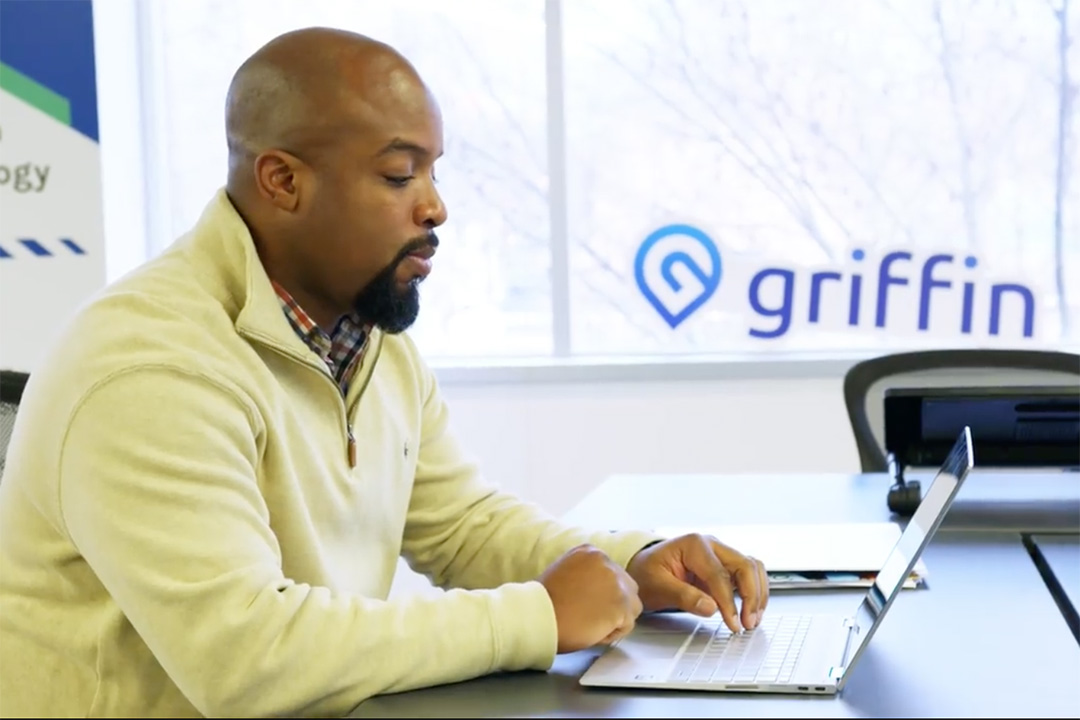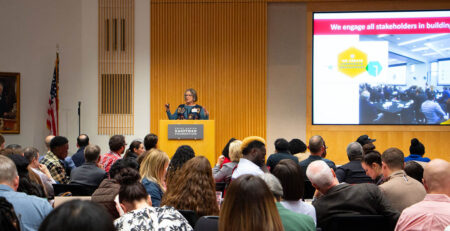Corporate Engagement in Action: How NBKC Banked on Fintech Entrepreneurs
This story is part of a series that explores how Kansas City corporations are supporting entrepreneurship and why corporate engagement is important. For more, explore the new We Create Corporate Engagement report.
Technology has created a more competitive marketplace for companies in many industries. Banks, for example, have been losing market share to non-banks and alternative financing companies for the last decade. Think: online lending platforms for home and car mortgages, online investment advisors, as well as e-wallets and mobile payment apps like Venmo.
Understanding that these emerging technologies are here to stay, the leaders of Overland Park, Kansas-based NBKC knew they had to proactively integrate them to support the bank’s traditional products and services.
But NBKC’s leadership saw an even bigger opportunity to engage. They asked themselves whether there was a way to create partnerships with these fintech startups—not only to solve the bank’s own challenges but also to address broader finance-related issues. Issues like financial literacy, banking the underbanked, streamlining the mortgage process—any technology that tackles the real-world banking or finance-related challenges of Americans. And, they reasoned, that kind of engagement could allow the bank to build a network of financial technology companies that would help solidify Kansas City as a fintech hub.
The outcome of those discussions was the launch of two, now-retired, initiatives, helmed by Zach Pettet: Fountain City Fintech in June 2018 and Entrepreneur in Residence in January 2019.
With the launch of those programs, NBKC became one of only about 20 banks nationwide that had fully committed to a position or a division with the sole charge of developing fintech startups.
With these programs, the bank and the fintech startups enjoyed a symbiotic relationship. The entrepreneurs brought technology and service-related innovation, and NBKC provided business development support as well as compliance, fiscal and legal requirements fintech companies need.
“These fintech companies are companies, not banks. They’re not regulated institutions,” said Zach Pettet, former vice president of fintech strategy at NBKC and the managing director at Fountain City Fintech and now director of strategic partnership at Bond Financial Technologies in San Francisco, California. “They are people with an idea. They think about things in a very different way generally than classical bankers. So, they’re building things differently. But that does not change the need for FDIC insurance. That does not change the need for compliant banking processes. Fintech platforms should have the same good data security. And they can’t do all that without good banking partners.”
[[CTA]]
Accelerating Fintech
For two years, Fountain City Fintech was an accelerator offering an aggressive 75-day program to fast track fintech startups from across the globe seeking a path to work with banks.
“We just tried to make that easier, simpler and quicker,” said Pettet.
Fountain City Fintech provided companies with office space, capital, educational content and a mentorship network—including access to NBKC’s CEO and CFO. The investment required of the fintech companies? A commitment of time and, for some companies, offering NBKC an equity stake. NBKC worked with more than 20 companies in two years.
Companies accepted into the program have already presented the bank with a wireframe outlining their idea and what they seek in a partnership with the bank. During the program, the company and the bank worked together to jointly develop the concept and execute it. Even after the conclusion of the program, NBKC continued to offer support in whatever way it can.
The companies that graduated from the program exited with an established partnership with NBKC—likely with the bank as their first customer—and were positioned to scale their companies with other community banks.
Entrepreneur in Residence
Less than a year after launching Fountain City Fintech, NBKC created an Entrepreneur in Residence (EIR) incubator that selected entrepreneurs who could uncover solutions in three main focus areas: (1) regulatory and compliance technology, (2) the savings crisis and (3) NLP/OCR mortgage technology.
EIR companies chose a focus area, researched the problem to be solved, developed a solution, validated the solution and build a company—all within three months.
EIR’s received a $5,000 stipend each month and access to relevant data, a live testing sandbox, NBKC leaders, office space at NBKC headquarters and guidance from NBKC’s Fountain City Fintech team.
Engaging Corporations to Get a Competitive Edge
Pettet said that EIR companies occasionally went through the Fountain City Fintech program, too, if they were ready for it and could benefit from it.
One such entrepreneur is Donald Hawkins, owner of Griffin Technologies. His company provides geolocation technologies for banks and financial institutions.
“Donald had something that he was working on in the retail space,” said Pettet. “I felt it had some potential mortgage use. He basically took one little conversation that we had, then went and had some more conversations and decided he was going to totally pivot to fintech.”
Hawkins’ technology focuses on the problem of bank-consumer interaction—or lack thereof. Hawkins said his products help connect bankers to their customers in the “moments that matter.”
“We give bankers the ability to target specific locations in their region to better understand their customers wants, needs and intent,” Hawkins said.
Hawkins explained that in today’s digital and drive-up world, few customers walk into a bank to engage one-on-one with bankers. And, although banks are rich with data, that data doesn’t tell the bank when a customer is primed for a purchase that might require a bank loan or other services.
Hawkins’ idea was to create a product that delivers those kinds of insights to banks, using banks’ own apps.
In a nutshell, here’s how the technology works. A proprietary software developer kit is embedded inside a bank’s mobile app. The bank can then target specific locations the customer visits. Think of homes for sale in a market, auto dealerships, wealth management companies. When a bank’s customers visit those types of locations, the app collects those location insights and provides real-time data to the bank.
“We just give the banking institution a little bit of an edge when their customers show intent to make a purchase,” said Hawkins.
Hawkins said that working with NBKC not only helped him refine and test his concept, NBKC opened the door to other banking relationships and encouraged him to rethink his distribution model. For example, he was able to leverage his relationship with NBKC to meet decision makers at the Independent Community Bankers of America, the largest community bank association in the country. Its members are 3,700 of the 5,200 community banks nationwide.
“We received a massive investment from them [ICBA] and also became a corporate member on their platform,” said Hawkins. “We’re also working toward becoming a preferred provider. So, we have a direct line of sight now to 3,700 customers versus our old go-to market strategy, which was trade shows, smile and dial, and sending emails and postcards.”
If not for the NBKC introduction, Hawkins estimates it would have taken Griffin Technologies at least 15 years to develop a relationship with the 3,700 banks, not to mention receive an investment from an association as large as ICBA.
“This could honestly work us all the way through an exit—just with them [ICBA],” Hawkins said.
KC as a Fintech Hub
Addressing NBKC’s larger goal of putting Kansas City on the map as a fintech hub, Pettet said the foundation already exists with companies like H&R Block, blooom, PayIt and others. What he sees as lacking, despite the plethora of business resources in Kansas City, is early-stage resources for fintech founders and a lack of specificity in talking about the kinds of companies we need in the ecosystem.
“If we want to be the most entrepreneurial city in America, we need to lean in very specifically to the industries that actually make sense for us to lean into,” Pettet said. “Based on the ecosystem that we have here—from H&R Block and everybody else—building the next financial company, building the next insurance technology company, building the next whatever has to be regulated but also has to be pretty innovative and forward thinking makes a lot of sense.”
Essential also to Kansas City becoming a fintech hub is a willingness to commit to doing it.
“What we [NBKC] did is very reproducible, and it makes me excited to see some other corporations starting to do accelerators. It comes down to other corporations specifically buying into the vision, being willing to start making either grants, investments, whatever it is, and really focusing it.
Tapping Startups to Meet Corporate Objectives
Pettet said there’s “something to be said for investing in funds,” but he also believes it’s important to invest in and find ways to do things “that benefit your corporation.”
“Sometimes I see corporations almost thinking of their venture capital investments as philanthropy,” he said.
Corporations, he believes, must think about how venture capital investments return dollars to shareholders or hedges some piece of their business.
“It’s thinking through the overlap of your business strategy and what could benefit the city and not just a ’hey, I gave to this venture fund at the office’ kind of a thing,” he stressed.
Banking on Business
Although being part of a vision that crystalizes Kansas City as a fintech hub is rewarding, Pettet emphasizes the vision must be supported by financial ROI for everyone.
“This is the future. The value of having a bank in your corner at an early stage is really hard to put a dollar amount on. We wanted to be able to roll up our sleeves and provide that value,” said Pettet. “But, at the same time, we wanted to make investments that align with the partnership strategy. The same way most banks have a consumer channel, a mortgage channel, a commercial lending channel, this, for us is it’s just another business channel. Working with startups like Griffin Technologies is a fintech partnership that helped us solve problems for other banks and for ourselves.
“We did this for financial reasons,” Pettet continued. “The impact on the balance sheet and the impact on the income statement was very real. There’s a real business case behind us this model.”





Leave a Reply